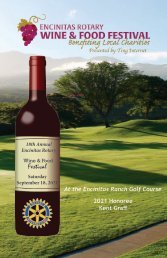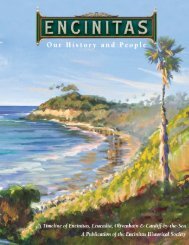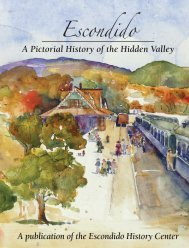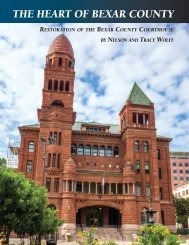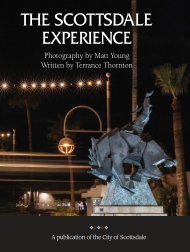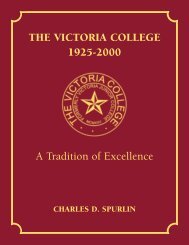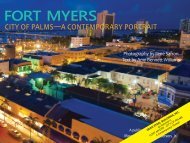Notable New Orleanians: A Tricentennial Tribute
An illustrated history of New Orleans paired with the histories of companies that have helped shape the city.
An illustrated history of New Orleans paired with the histories of companies that have helped shape the city.
You also want an ePaper? Increase the reach of your titles
YUMPU automatically turns print PDFs into web optimized ePapers that Google loves.
J OSEPH V ACCARO (1855-1945)<br />
AND F AMILY<br />
Joseph Vaccaro, his two younger brothers (Felix and Luca), and his sister Marie, represented by<br />
her husband Salvador D’Antoni, created the prominent <strong>New</strong> Orleans shipping business Standard<br />
Fruit & Steamship Company in the heyday of the Port of <strong>New</strong> Orleans. Along with its rival United<br />
Fruit Company, Standard Fruit made <strong>New</strong> Orleans the nation’s premier importer of fruit, from<br />
coconuts to bananas. The business was particularly important to <strong>New</strong> Orleans because imports had<br />
long been a weakness of the port.<br />
Born in Contessa Entellina, Sicily, Joseph Vaccaro arrived in the United States with his father<br />
after the Civil War. At first a common laborer, by the age of twenty he had started a small retail<br />
fruit business in the French Market. He transformed it into a wholesale business, then added the<br />
Louisiana orange crop to his inventory. A great freeze, in 1899, forced Vaccaro into bananas and<br />
other imports, a decision that led to purchasing ships to transport the fruit.<br />
After 1899 Joseph operated as the Vaccaro Bros, only later becoming the Standard Fruit &<br />
Steamship Company. The company incorporated in 1905 with Joseph Vaccaro as president and<br />
brother-in-law Salvador D’Antoni Foreign General Manager. Later the Vaccaro Bros. invested in ice<br />
companies, Union Indemnity Insurance Company, the Chalmette Oil Refinery, and Tropical<br />
Printing Co. In 1925, they purchased the declining Grunewald Hotel and built an annex on<br />
Baronne Street, nearly doubling its size. It was then that Vaccaro Brothers renamed the Grunewald<br />
The Roosevelt Hotel.<br />
The following year Standard Fruit went public, with bankers Washington Irving Moss, Harold<br />
<strong>New</strong>man, and Rudolph Hecht joining the board of directors. Moss then became chairman of the<br />
board and Felix Vaccaro president.<br />
In 1931, Salvador D’Antoni became president of Standard. Two years later Standard reverted<br />
back to the Vaccaros when the Great Depression prevented the bankers from honoring their commitments.<br />
At this point Felix Vaccaro became chairman of the board and Salvador D’Antoni president.<br />
In 1935, Salvador D’Antoni bought out the now elderly Vaccaro brothers. His son Blaise<br />
D’Antoni became vice president in 1947 and followed his father as president from 1949-1952. Dr.<br />
Joseph D’Antoni followed his brother until 1964, when the family sold out to Castle and Cook,<br />
Inc. By 1968, Castle and Cook had assumed full ownership, the Vaccaro-D’Antoni assets now an<br />
indistinguishable part of the Dole Company.<br />
<br />
Joseph Vaccaro.<br />
FROM NEW ORLEANS: THE CRESCENT CITY, NEW<br />
ORLEANS: GEORGE ENGELHARDT, 1903.<br />
For additional reading see Thomas L. Karnes, Tropical Enterprise: The Standard Fruit & Steamship Company in Latin<br />
America. Baton Rouge: Louisiana State University Press, 1978.<br />
A LCÉE<br />
F ORTIER<br />
(1856-1914)<br />
Alcée Fortier established the legitimacy of <strong>New</strong> Orleans Creole literature as an academic discipline.<br />
A professor of French at Tulane University, he studied and wrote about the various dialects<br />
in Louisiana and incorporated them into his class lectures.<br />
Born in St. James Parish the grandson of fabled planter Valcour Aime, Fortier was connected to<br />
most of the prominent Creole families. Yet, he studied all Louisiana dialects, including the Acadian,<br />
Isleno, and African-American. The Modern Language Association, formed in 1883, later elected<br />
him president. His concern for Louisiana dialects led him to be active in the American Folklore<br />
Society, while his history of Louisiana led to the presidency of the Louisiana Historical Society during<br />
one of its most productive periods.<br />
BIOGRAPHIES<br />
89









